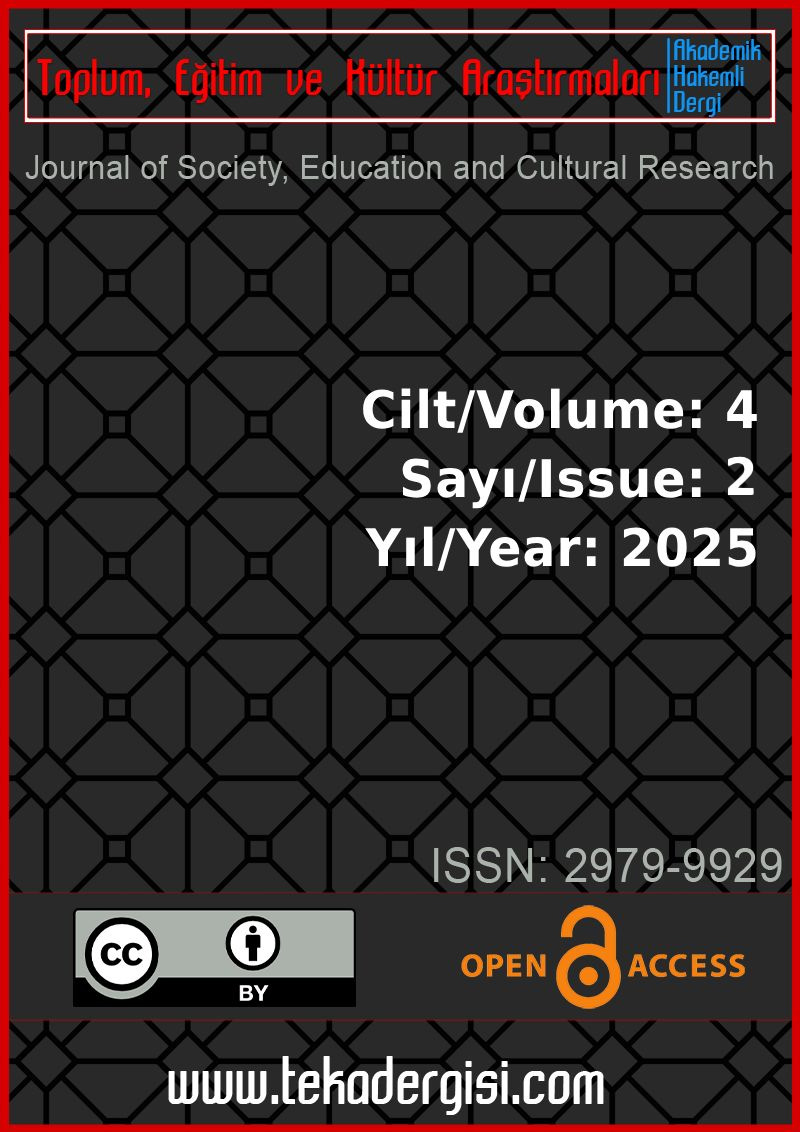The Use of Generative Artificial Intelligence in the Scientific Research Process: Opportunities and Ethical Concerns
DOI:
https://doi.org/10.5281/zenodo.17127884Keywords:
Generative AI , scientific research , opportunitiesAbstract
This study aims to explore university students’ views and experiences regarding the use of Generative Artificial Intelligence (GenAI) in the scientific research process, with a particular focus on opportunities and ethical dilemmas. Employing a phenomenological design within qualitative research methods, the study was conducted in the 2024–2025 academic year with undergraduate and graduate students at a public university. Participants were selected using the convenience sampling technique, and data were collected online through a semi-structured interview form developed by the researchers. The data were analyzed using descriptive and content analysis techniques. Findings indicate that students predominantly use general-purpose tools such as ChatGPT during the research process. While GenAI provides various cognitive and functional opportunities, it also raises concerns in epistemological, ethical, and humanistic dimensions. Students reported facing ethical dilemmas particularly related to the reliability of generated knowledge, academic integrity, technical competence, and privacy. The results highlight the necessity of fostering students’ awareness and competence in the conscious and responsible use of GenAI in research practices, alongside the development of supportive policies and measures.
References
Alasadi, E. A., & Baiz, C. R. (2023). Generative AI in Education and Research: Opportunities, concerns, and solutions. Journal of Chemical Education, 100(8), 2965-2971. https://doi.org/10.1021/acs.jchemed. 3c00323
Bahroun, Z., Anane, C., Ahmed, V., & Zacca, A. (2023). Transforming education: A comprehensive review of generative artificial intelligence in educational settings through bibliometric and content analysis. Sustainability, 15(17), 12983. https://doi.org/10.3390/su151712983
Bail, C. A. (2024). Can Generative AI improve social science?. Proceedings of the National Academy of Sciences, 121(21). https://doi.org/10.1073/pnas.2314021121
Barros, A., Prasad, A., & Śliwa, M. (2023). Generative artificial intelligence and academia: Implication for research, teaching and service. Management Learning, 54(5), 597-604.https://doi.org/10.1177/ 13505076231201445
Büyükada, S. (2024). Akademik yazımda yapay zekâ kullanımının etik açıdan incelenmesi: ChatGPT örneği. Rize İlahiyat Dergisi, (26), 1-12. https://doi.org/10.32950/rid.1337208
Chan, C. K. Y., & Hu, W. (2023). Students’ voices on generative AI: Perceptions, benefits, and challenges in higher education. International Journal of Educational Technology in Higher Education, 20(1), 43. https://doi.org/10.1186/s41239-023-00411-8
Chanpradit, T. (2025). Generative artificial intelligence in academic writing in higher education: A systematic review. Edelweiss Applied Science and Technology. https://doi.org/10.55214/ 25768484.v9i4.6128.
Creswell, J. W. (2007). Five qualitative approaches to inquiry. Sage.
Creswell, J. W. (2008). Educational research planning, conducting and evaluating quantitative and qualitative research. International Pearson Merril Prentice Hall.
Demirel, E. T. (2024). The use and perceptions towards aı tools for academic writing among university students. Innovations in Language Teaching Journal, 1(1), 1-20. :https://doi.org/10.53463/innovltej.20240328
Epstein, Z., Hertzmann, A., Herman, L., Mahari, R., Frank, M., Groh, M., Schroeder, H., Smith, A., Akten, M., Fjeld, J., Farid, H., Leach, N., Pentland, A., & Russakovsky, O. (2023). Art and the science of generative AI. Science, 380, 1110 - 1111. https://doi.org/10.1126/science.adh4451.
Ersöz, A. R., & Engin, M. (2024). Exploring ethical dilemmas in the use of artificial intelligence in academic writing: Perspectives of researchers. Journal of Uludag University Faculty of Education, 37(3), 1190-1208. https://doi.org/10.19171/uefad.1514323
Gül, F. Ö. (2024). Eğitimde yapay zekâ: Eğitim fakültesi akademisyenleri için fırsatlar ve riskler. Medeniyet Eğitim Araştırmaları Dergisi, 8(2), 71-97.
Güler, P., Gülşenoğlu, S., & Sayılır, M. (2025). Akademik yazmada kullanılabilecek yapay zekâ araçlarının sınıflandırılması. Eğitim Bilimleri Tematik Araştırmalar Dergisi, 1(2), 76-97.
Gümüş, Y. E., & Kocabıyık, Y. (2023). Yapay zekâ teknolojisi yaratıcı yazarlığa karşı: Dijital çağda yaratıcı yazarlığın dönüşümü. Turkish Online Journal of Design Art and Communication, 13(4), 1178-1191. https://doi.org/10.7456/tojdac.1323219
Holmes, W., & Miao, F. (2023). Guidance for generative AI in education and research. Unesco Publishing.
Johnston, H., Wells, R. F., Shanks, E. M., Boey, T., & Parsons, B. N. (2024). Student perspectives on the use of generative artificial intelligence technologies in higher education. International Journal for Educational Integrity, 20(1), 2. https://doi.org/10.1007/s40979-024-00149-4
Kim, J., Yu, S., Detrick, R., & Li, N. (2025). Exploring students’ perspectives on Generative AI-assisted academic writing. Education and Information Technologies, 30(1), 1265-1300. https://doi.org/10.1007/s10639-024-12878-7
Laflamme, A., & Bruneault, F. (2025). Redefining academic integrity in the age of generative artificial ıntelligence: the essential contribution of artificial ıntelligence ethics. Journal of Scholarly Publishing, 56, 481-509. https://doi.org/10.3138/jsp-2024-1125
Mah, C., Walker, H., Phalen, L., Levine, S., Beck, S. W., & Pittman, J. (2024). Beyond CheatBots: Examining tensions in teachers’ and students’ perceptions of cheating and learning with ChatGPT. Education sciences, 14(5), 500. https://doi.org/10.3390/educsci14050500
Özdemir, M., & Tuti, G. (2023). Nitel araştırma desenleri: Metodolojik bir temellendirme. Çankırı Karatekin Üniversitesi Karatekin Edebiyat Fakültesi Dergisi, 11(2), 217-235. https://doi.org/10.57115/karefad.1331759
Ruiz-Rojas, L. I., Acosta-Vargas, P., De-Moreta-Llovet, J., & Gonzalez-Rodriguez, M. (2023). Empowering education with generative artificial intelligence tools: Approach with an instructional design matrix. Sustainability, 15(15), 11524. https://doi.org/10.3390/su151511524
Saban, A., & Ersoy, A. (2016). Eğitimde nitel araştırma desenleri. Anı Yayıncılık.
Sayın, A. & Melanlıoğlu, D. (2024). Üniversite öğrencilerinin yazılı üretimlerinin OpenAI GPT ile değerlendirilmesi. Yükseköğretim Dergisi, 14(3), 121-134. https://doi.org/10.53478/yuksekogretim. 1418870
Türk Biyokimya Derneği (TBD) Akademi Eğitim Grubu. (2023). Yapay zeka araçlarının eğitimde kullanılmasına ilişkin durum raporu ve öneriler. https://turkbiyokimyadernegi.org.tr/upload/ TBDYapayZeka.pdf
Ugwu, N. F., Igbinlade, A. S., Ochiaka, R. E., Ezeani, U. D., Okorie, N. C., Opele, J. K., Onayinka, T., Iroegbu, O., Onyekwere, O., Adams, A., Aigbona, P., & Ojobola, F. (2024). Clarifying Ethical Dilemmas in Using Artificial Intelligence in Research Writing: A Rapid Review. Higher Learning Research Communications, 14(2), 29-47. https://doi.org/10.18870/hlrc.v142.1549
Uslu, B. (2023). Üniversitelerde yapay zekânın kullanım alanları: Potansiyel yararları ve olası zorluklar. Eğitimde Kuram ve Uygulama, 19(2), 227-239. https://doi.org/10.17244/eku.1355304
Xu, L. (2020). The dilemma and countermeasures of AI in educational application. In Proceedings of the 2020 4th İnternational Conference on Computer Science And Artificial İntelligence (pp. 289-294).
Downloads
Published
How to Cite
Issue
Section
License
Copyright (c) 2025 Toplum, Eğitim ve Kültür Araştırmaları Dergisi

This work is licensed under a Creative Commons Attribution 4.0 International License.


